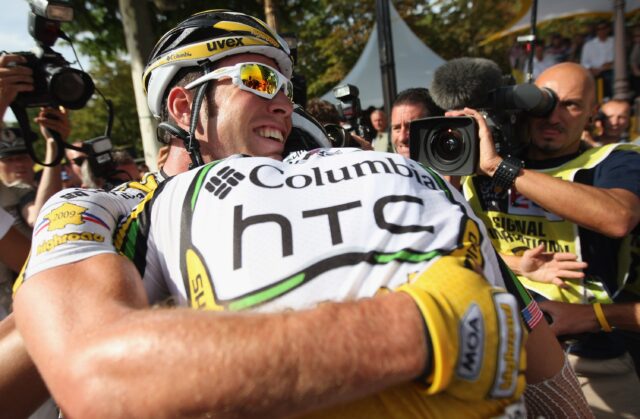A version of this piece was first published on 3 July 2023
—
Mark Cavendish once gave me the look.
It was an interview in a hotel lobby in Yorkshire; he was slightly late and apologised profusely, then answered questions about the Tour de France with enthusiasm and detail. For some reason, I thought 10 minutes of flowing conversation made me his trusted confidant, so I looked him in the eyes and asked the question he didn’t like answering: how much do you want to break Eddy Merckx’s Tour stage record? He shrugged it off. But what would it mean to you? He went quiet. Wouldn’t it crown your legacy?
The look was somewhere in the Venn diagram of anger and disdain, and I half expected him to walk off. He stayed, but in that brief moment, I felt the gentlest prod of his famous spikiness. Cavendish was once asked what he’d learned from a difficult day on the bike. “That journalists sometimes ask some stupid f***ing questions,” he replied.
On the long journey to his historic 35th stage win, teammates and rivals have all felt Cavendish’s sharp tongue. He would slam doors if a stage didn’t go to plan. Helmets were thrown.
“We stood on the bus after races and screamed at each other,” his former lead-out man Mark Renshaw tells me.
Cavendish’s teammate Michael Morkov says of spending a month in each other’s pockets: “He’s definitely a character, so there are ups and downs. He has quite a temper.”
One of Cavendish’s greatest rivals, Marcel Kittel, tells a story from the Tour in 2012. “On the start line at different stages – it happened more than once – he was not happy with his bike computer and he was yelling and screaming at his mechanic, next to all the other riders. Everyone was just looking away [thinking] ‘you cannot do that Cav, it’s really crazy and it’s really disrespectful.’
“But everyone at the same time was like, ‘he can actually be a really nice guy’. It’s just… him.”
***
He took off skin from the top of the shoulders to his butt cheek – he took off his whole back
Mark Renshaw
Renshaw was Cavendish’s loyal lieutenant through much of his career. On the surface there was little to unite a laidback Australian with a hyped-up Manxman; one was stoic and calculated, the other often emotional and impulsive. But Cavendish needed Renshaw’s calm head on the road, and their temperaments complemented each other.
“I don’t think you could have two Mark Cavendishs in a team and that would work,” Renshaw says gravely, as if genuinely disturbed by the image he has created.
Cavendish disrupted the existing order straight away, winning four stages at his first Tour de France in 2008, and he was paired with Renshaw the following year. Their first lead-out was a mess but “within six months we had it pretty much down pat”.
Their first Tour together would be Cavendish’s most fruitful, winning six stages in all, a rare feat (the record in a single Tour is eight). The highlight was undoubtedly the last day in Paris, winning on the Champs-Elysees where Renshaw finished behind him in a one-two. It was evident that Renshaw could have been a winner in his own right, and “the world’s best lead-out man” was soon recognised, not least by Cavendish who would eulogise about his friend.
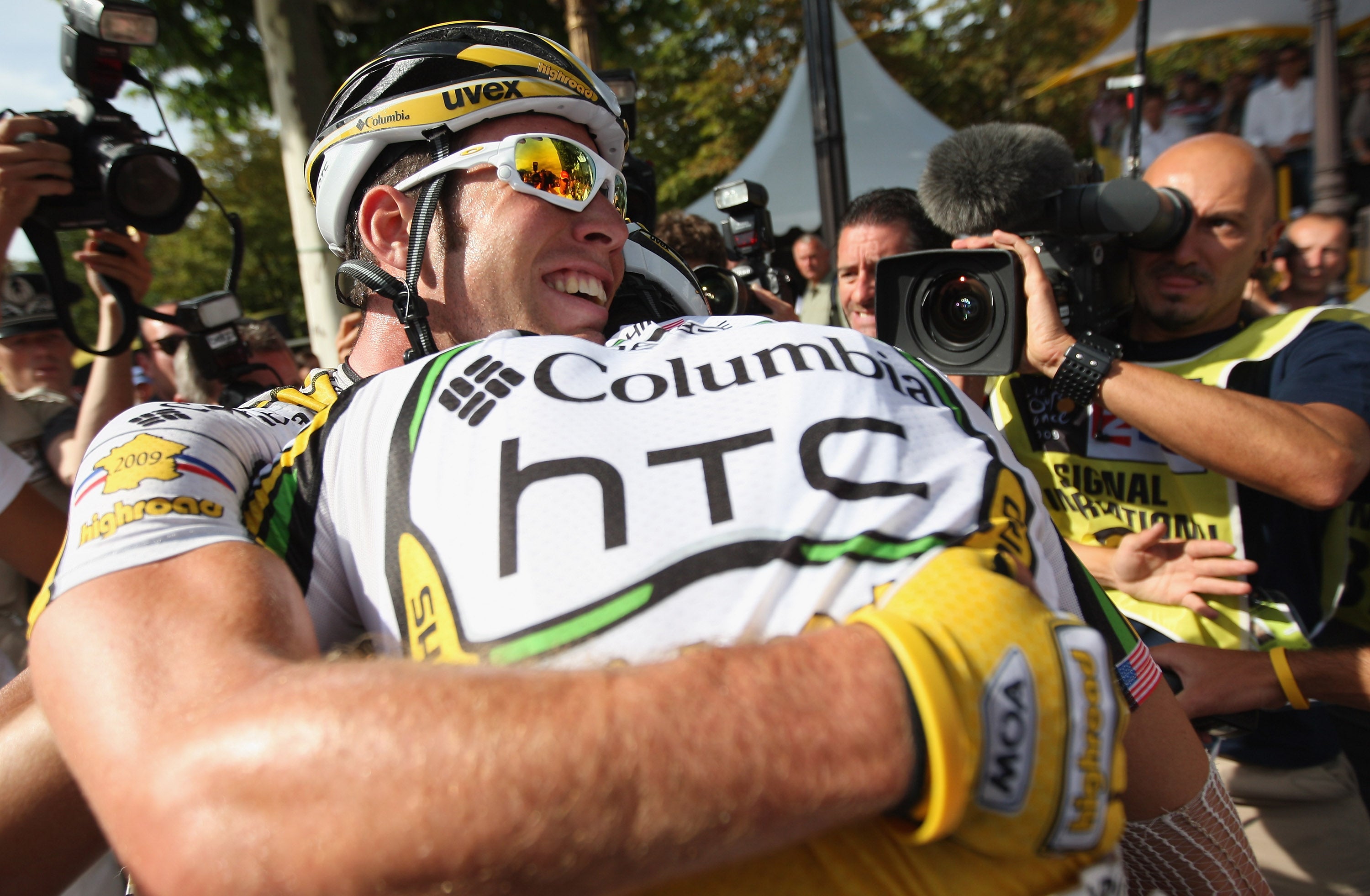
Renshaw’s brief was to lead Cavendish through the melee and present him near the finish like a king on a cushion. He was satnav, windshield and security operation all in one. “If I had to ride in the wind, if I had to move him up in a hard section… I’d do that bodyguarding around the peloton because you’re not the most popular rider when you’re winning five stages in the Tour.”
Renshaw could have been jealous or competitive but he knew that they were different animals. “Stack us up against each other in training and I could get close. But where there’s a finish line and a big prize, he just goes that 1 or 2 per cent deeper than anybody else, he goes that little bit harder, hurts himself a little bit more. He’s got that extra drive and that cunning decision-making you need to be a winner.”
The team held a deep respect for Cavendish. “When he walked into the room, everyone lifts because they know he’s the best,” says Renshaw. And what stood out beyond the burgeoning collection of trophies and jerseys was a unique ability to deal with setbacks, to thrive in them.
“One of the moments that most shocked me was the year he had a massive crash in the Tour de Suisse. He took off skin from the top of the shoulders to his butt cheek – he took off his whole back. And he turned around two weeks later for the Tour and was straight back into winning. I just didn’t see that in many other riders.”
***
He was welcoming me on the top level of sprinters. He made that step towards me, not away
Marcel Kittel
Cavendish was a nightmare to race against. His period of sprinting dominance was akin to Roger Federer or Tiger Woods, particularly at the Tour de France. There were 180 of the world’s most athletically outstanding humans on the start line competing for 21 stages, and for most riders just winning one was an unqualified success. Cavendish won 23 stages from 2008-2012, at 4.6 stages per Tour.
He was smaller and lighter than many of his rivals, a tightly wound ball of muscle, and his biggest weapon was his explosive acceleration. He had an erratic, swaying style that was rare and intriguing to fans and the media. By his second year, he had developed an aura. He was undisputedly the fastest man in the world. Rivals were beaten by centimetres on the finish line, but they’d already lost to his presence at the start.
“For me, Cav was the man to beat,” says Marcel Kittel, the German sprinter who won 14 Tour stages and developed a fierce rivalry.
Cavendish’s relationship with Renshaw was crucial, but following a lead-out wasn’t his only way to win. He could be out of the picture, his teammates nowhere to be seen, and quietly surf wheels to the front to pickpocket a victory someone thought they owned. “He behaved unpredictably,” Kittel tells The Independent. “He always made it difficult to anticipate his next move.”
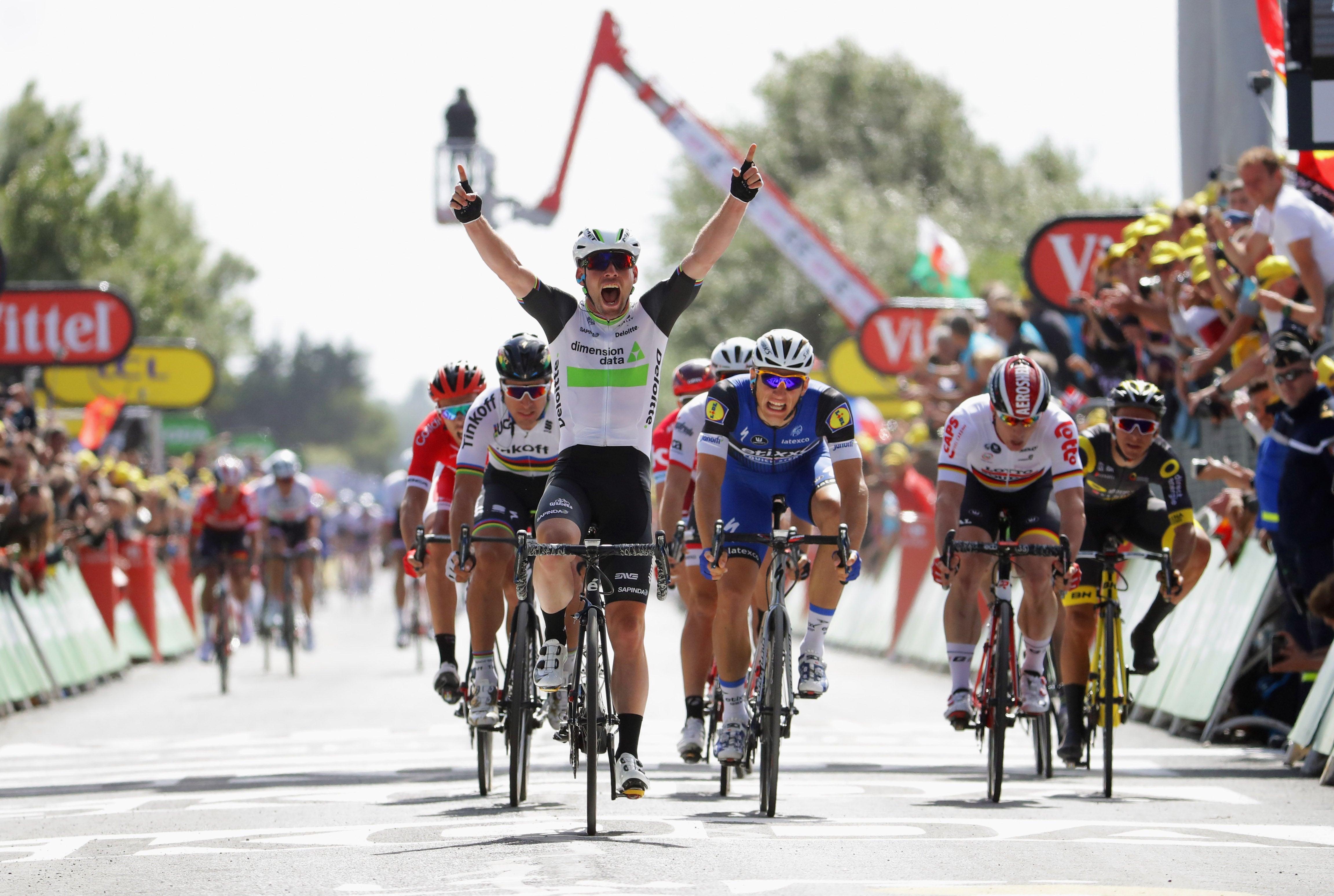
Off the bike their relationship could be “uncomfortable”, Kittel says, but it was also full of respect. “He hates to lose and after the finish, you can really feel that – for me it’s the same. But in 2013 he was congratulating me after my first stage win and saying, ‘this is going to change your life’. He was welcoming me to the top level of sprinters. He made that step towards me, not away.”
Kittel is already retired and commentating on the Tour at 36, and these days he and Cavendish exchange stories in the paddock. They are united by a shared experience that few understand: how it feels to ride hip to hip in a tunnel of deafening noise on the finish straight of the Tour de France.
But for all that they share, Kittel points out that they were very different athletes. “He is into the history of the sport, he loved the past legends and the stories. I have a different perspective on cycling: I enjoyed it, and I still enjoy it, but I didn’t have ambitions to write history.”
***
He always searches for something deeper than just winning the races
Michael Morkov
The autumn of Cavendish’s career has been full of adversity: the brutal crash in Vittel that put him out of the 2017 Tour with a broken shoulder, for which Peter Sagan was disqualified; struggles with mental health; repeated bouts of the Epstein-Barr virus which left him barely able to ride.
His return to the Tour de France, with QuickStep in 2021, was only through a stroke of fortune when the team’s lead sprinter Sam Bennett suffered a knee injury; Cavendish was paired up with Bennett’s renowned lead-out artist, the steely Danish rider Michael Morkov.
As with Renshaw, they kept missing each other in their first race at the Tour of Belgium, so before the Tour de France, Morkov and Cavendish sat down for a frank conversation.
“I had the feeling we were not really united, to be honest, maybe not on the same page,” Morkov tells The Independent. “I said to him, ‘look, I really believe that you can win a stage here in France’. I think coming there he didn’t really believe he could win, but when I said that to him, I could really see that light in his eyes. He was ready.”
Their first win together required some improvisation after a crash scuppered their lead-out train near the finish. “I moved him up and dropped him off at the front with 500 metres still to go. When I came to the finish line I could not believe it when he said he actually won.”
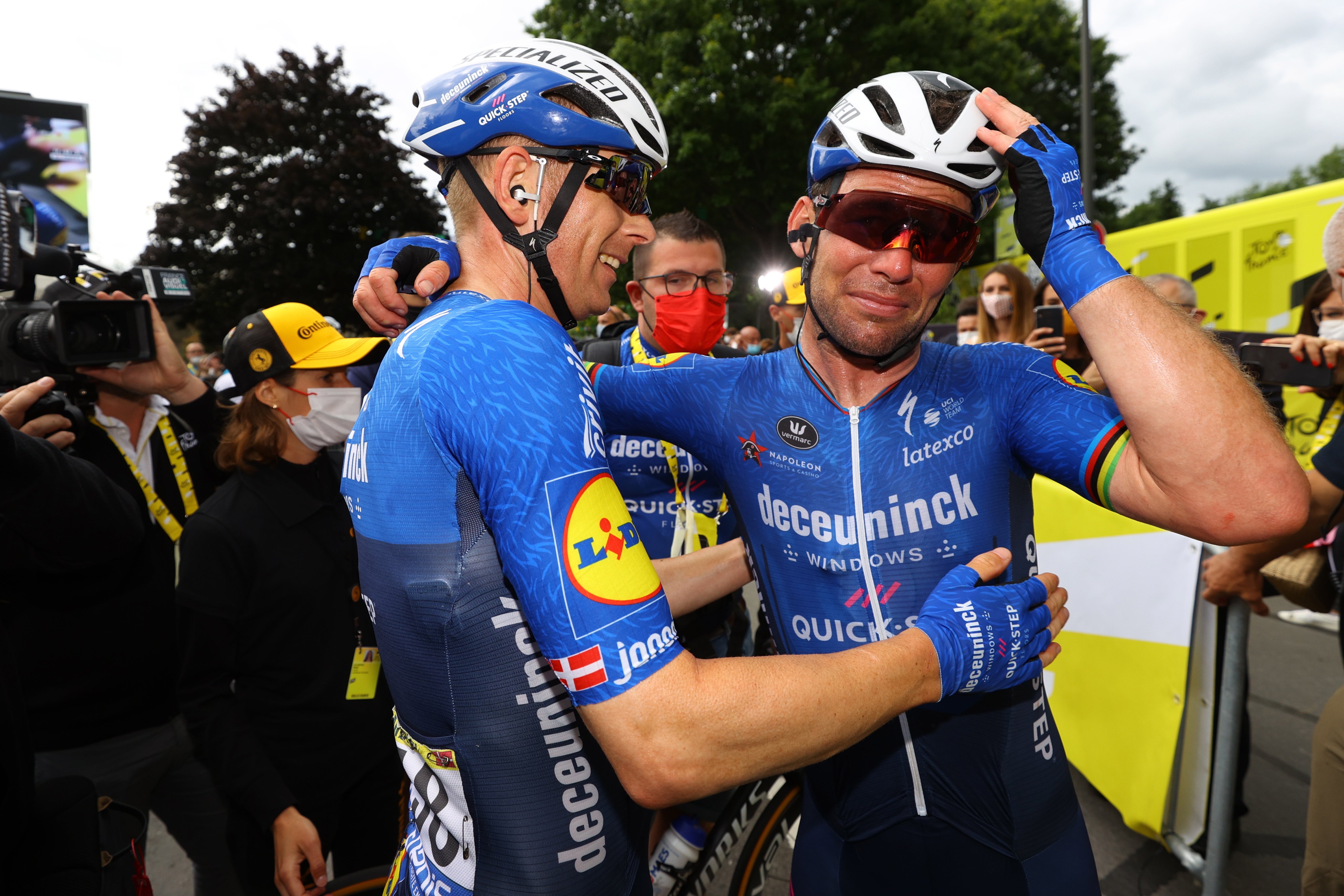
There was intense expectation on the sprint stages at QuickStep, but also huge pressure to get Cavendish through the mountains inside the time limits each day to avoid elimination, most notably the brutal double ascent of Mont Ventoux.
“Cav was really on the limit that day, he’s in the zone, he doesn’t reply. Then we pass the monument of Tom Simpson [the British rider who died on Ventoux in 1967] and suddenly he stops, pulls off his helmet and he bows to the monument. We were so nervous because he was on the limit to finish the stage.
“Then we have to pass the monument again. I went to him and I said, ‘mate, I admire that you make a salute for the monument, but please stay focused because we are five guys here who worked the whole day to get you through’. So he went to the car and he picked up a cycling cap, and when we passed the monument again he threw the cap and made another ‘hello’ to Tom Simpson. I think we made the time limit with less than a minute.”
When they eventually finished, Cavendish slumped as the teammates who had shielded him from the wind bumped fists and patted backs like they’d won another stage.
“For me, it’s actually a typical Cav story,” says Morkov. “Because even though there is so much pressure, he always searches for something deeper than just winning the races.”
***
We didn’t just sit around a campfire. We bloody went head to head with the best in the world
Mark Renshaw
Fundamentally, you have to be clinically insane to be a sprinter. Humans should have no desire to ride a bike at 50mph, shoulder to shoulder with other maniacs while wearing lycra. But elite sprinters are wired differently. Cavendish competes with his emotions on the edge because it is on the sharp edges of cycling that he has built his career, where success is measured by milliseconds.
To thrive and to win, Cavendish needs to be at his most intense; he needs to walk into a room and demand everything from everyone, including himself. And the only way to get himself there is to feel pressure, like flames on the skin.
“He’s much quieter in real life,” says Renshaw. “I think you only see the 15 minutes of fame sometimes. Yeah, we didn’t just sit around a campfire and sing. We bloody went head to head with the best in the world.”
In many ways, he has gone full circle. Cavendish arrived as a disruptor, an outsider – an “underdog”, as he called himself in his book, “who learned to scrap and scratch because it was the only way for me to survive”. Now, more than ever, he is the underdog again. Few believe he is the quickest in the peloton now, and that has added more fuel.
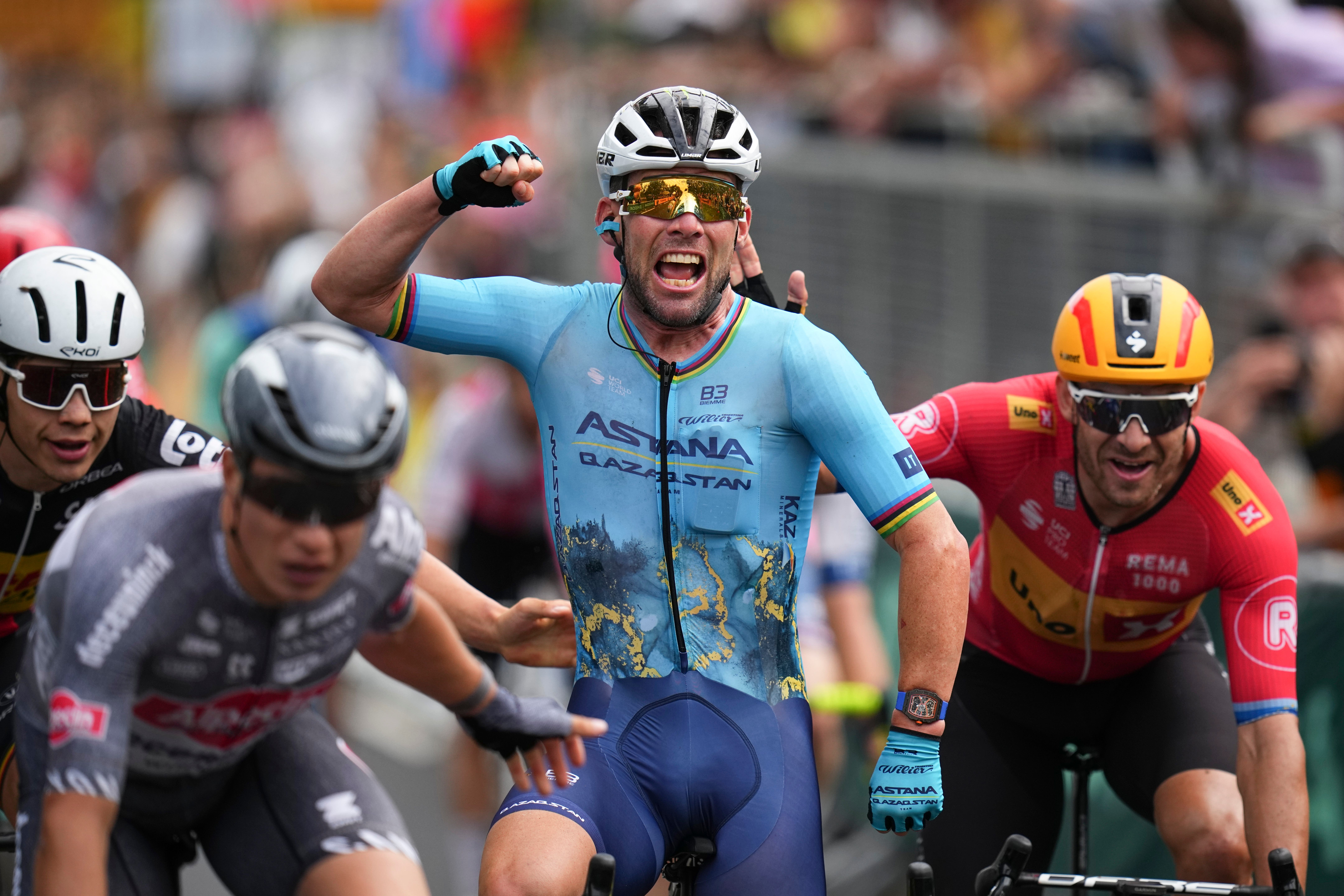
Last year, Cavendish brought Renshaw back into his corner to consult with his new Astana teammates on lead-out precision and, presumably, to prepare them for the entire Mark Cavendish Experience. This year he reunited with Morkov, too, as if he needed to piece together the greatest parts of his career before he could complete it.
He had put off retirement year after year, desperate to surpass Merckx, giving everything to get there. With each passing stage, with each finished Tour, it seemed further from his grasp. Yet this time, against a stacked field on stage five, Cavendish produced a sprint for the ages, skipping through the chaos, hopping from wheel to wheel until suddenly he was in clean air, head down, hurting to the line.
“Do you know what bothers me,” Cavendish said last year. “Everyone calls it Merckx’s record. It’s not Merckx’s record, it’s our record. I won’t break his record; I’ll break our record.”
It’s his now.


